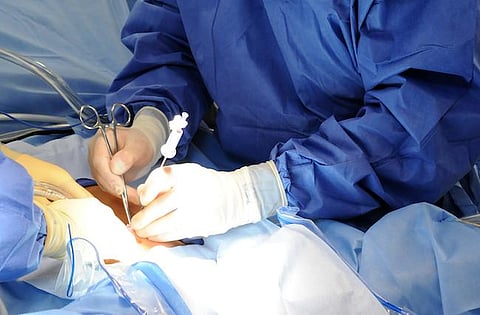

Dr. MM Yusuf is a surgeon who specialises in open heart surgeries. Patients seek him out from far away cities and from other hospitals, when they are told that only surgery will fix their conditions. These days, however, Dr. Yusuf is avoiding open heart surgery whenever possible.
A senior heart surgeon at the Apollo Hospitals in Chennai, Dr. MM Yusuf has had a long and successful career performing life-saving surgery for thousands of patients over the years. From the now very common Coronary Artery Bypass Graft - heart bypass surgery - to Mitral Valve replacement, Aortic aneurysm surgery and heart transplants, Dr. Yusuf has performed countless surgeries. His biggest learning -- perhaps an obvious one: patients fear open-heart surgeries.
But there’s now good news. “People don’t have to think that open heart surgery means cutting open the chest and the pain and trouble of that. That’s not there anymore,” he says.
Advanced heart procedures
Advances in medical and surgical techniques have taken the fear out of heart surgeries, and Dr. Yusuf has been quick to adapt. He is now one of the leading heart surgeons who performs the highly effective Minimally Invasive Hybrid Revascularisation procedure for patients with severe heart diseases.
“One thing about this minimally invasive procedure is that the scare of open heart surgery is not there anymore. More than 70% of triple vessel Coronary artery disease can be handled this way. That is something even many cardiologists are not aware of,” says Dr. Yusuf.
“Revascularisation is getting blood flow back to the blood vessels,” Dr. Yusuf explains. One of the major problems with the heart is the vessel problem. That is, for the heart to pump, it needs blood supply. There are three vessels that take blood to the heart. Blockages in those causes heart attack or angina. Blocks can be alleviated using surgery or stents: small mesh like tubes that crush the blocks and open the vessel for blood flow again.
.jpg?w=640&auto=format%2Ccompress)
Dr. MM Yusuf
And till recently, surgery meant open heart surgery, where doctors will cut open the chest cavity, expose the heart to perform surgery, and once blocks are removed or bypassed, restore blood supply and close the cuts.
This was a risky proposition. Many patients presented co-morbid conditions. That is, complicating circumstances like age, or other diseases like diabetes, or kidney failure, which made surgery nearly impossible.
That’s when stents became a viable option. These stents were deployed into the blood vessels using non-invasive or very minimally invasive procedures and placed over the blocks in the vessels. This opened up the vessel for better blood flow and prevented blocks from forming again. However, large number of patients with triple vessel and left main coronary artery disease especially diabetic patients require CABG. Now, Hybrid Revascularisation is helping these patients with heart disease get a new lease of life.
“About 2/3rd of the patients I see have blocks,” says Dr. Yusuf. “The blood vessel blocks are mostly handled using stenting. Say, 60% of the patients. Of the remaining 40% of patients, about two-thirds are treated with surgery. Within the surgical group, almost 70% of patients can be treated with this hybrid revascularization - which is bypass combined with stenting. Only a small portion of them will have to go for open heart surgery.”
With the minimally invasive hybrid revascularisation, Dr. Yusuf makes a small cut in the fleshy part of the patient’s chest and accesses the coronary arteries through it. Using video assisted scopes or cameras, the surgeon then performs a bypass graft: creating a different channel for the blood to flow over the blocked vessel, and into the heart. The earlier procedure required surgeons to make a deep cut in the patient’s chest bone, expose the heart, divert blood flow away to an external machine, and then perform the graft. Today, Dr. Yusuf can do this with the smallest of cuts and with video devices.
Once the graft is performed (usually from the Left Internal Mammary Artery to the Left Anterior Descending artery) the patient is transferred to a Coronary Care Unit. The next day, the patient is taken to the cath lab, where stents are deployed over additional blocked vessels, and then moved to the ward.
Be home sooner
The entire procedure takes a few hours, says Dr. Yusuf. “Recovery time is not as long as it used to be. With minimally invasive surgery, hospital stay is 3-4 days, and recovery period is two weeks. And we’re doing this routinely,” he adds.
There are other advantages as well. “Very little blood loss. Rarely do they need transfusion,” the doctor says, which means the risk and fear of transfusion is removed. Patients stay in the hospital for a much shorter time and are back to their normal routines in 2 weeks. The whole procedure including bypass graft and stents and the recovery time also has a cost benefit when compared to open heart surgery.
“We’ve done this minimally invasive surgery for about 9 patients in the last 3 months. Of which at least two patients were considered high risk. One had multiple myeloma - blood cancer - and the other one had low heart function with kidney problems as well. For these patients, we were able to avoid complications using this minimally invasive procedure,” says Dr. Yusuf.
The hybrid revascularisation procedure combines the advantages of two effective treatments for heart diseases, and gives patients greater hope, and a healthier life. Dr. Yusuf has the closing words. “Don’t be worried about heart surgery, it’s not as scary anymore.”
This article is a part of a partnership series between The News Minute and Apollo Hospitals to bring you latest medical developments and inspiring stories. The article was produced by TNM Marquee in association with Apollo Hospitals.